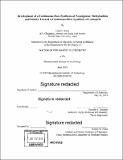| dc.contributor.advisor | Timothy F. Jamison. | en_US |
| dc.contributor.author | Kelly, Liam P.(Liam Porter) | en_US |
| dc.contributor.other | Massachusetts Institute of Technology. Department of Chemistry. | en_US |
| dc.date.accessioned | 2019-11-12T17:38:59Z | |
| dc.date.available | 2019-11-12T17:38:59Z | |
| dc.date.copyright | 2019 | en_US |
| dc.date.issued | 2019 | en_US |
| dc.identifier.uri | https://hdl.handle.net/1721.1/122853 | |
| dc.description | Thesis: Ph. D., Massachusetts Institute of Technology, Department of Chemistry, 2019 | en_US |
| dc.description | Cataloged from PDF version of thesis. | en_US |
| dc.description | Includes bibliographical references. | en_US |
| dc.description.abstract | [color illustration] Herein, we describe the development of a continuous flow synthesis of neostigmine methyl sulfate, an acetylcholinesterase inhibitor on the WHO list of essential medicines, and the transfer of the synthesis into a next-generation reconfigurable frame developed by our collaborators. Starting from 3-dimethylaminophenol, the synthesis provides a throughput of approximately 46.8 g/day (or 93,600 doses/day) of crude neostigmine methyl sulfate. The synthesis also showcases a prototype in-line evaporation unit that operates without any added carrier gas. Dr. Christina Dai performed early screening of lithium bases. Dr. Yuqing Cui and Dr. Naomi Briggs developed the downstream purification sequence. Dr. Nopphon Weeranoppanant developed the in-line evaporator and, along with Dr. Dale Thomas, assisted with performing the synthesis within their developed frame. Liam P. Kelly developed the continuous synthesis of neostigmine methyl sulfate. [color illustration] Lisinopril is a member of a large family of ACE inhibitors generally known as N-carboxyethyl dipeptides. Of this family, lisinopril is the most commonly prescribed. All known routes to lisinopril require isolation of several synthetic intermediates and protecting group manipulations, thus, development of an efficient continuous synthesis would provide great benefit. Herein we describe our investigation of several routes to generate intermediates of lisinopril with the end goal of a fully continuous synthesis, high material throughput, and minimal protecting group manipulations. Liam P. Kelly performed all work described within this chapter. | en_US |
| dc.description.statementofresponsibility | by Liam P. Kelly. | en_US |
| dc.format.extent | 161 pages | en_US |
| dc.language.iso | eng | en_US |
| dc.publisher | Massachusetts Institute of Technology | en_US |
| dc.rights | MIT theses are protected by copyright. They may be viewed, downloaded, or printed from this source but further reproduction or distribution in any format is prohibited without written permission. | en_US |
| dc.rights.uri | http://dspace.mit.edu/handle/1721.1/7582 | en_US |
| dc.subject | Chemistry. | en_US |
| dc.title | Development of a continuous-flow synthesis of neostigmine methylsulfate and studies toward a continuous-flow synthesis of lisinopril | en_US |
| dc.type | Thesis | en_US |
| dc.description.degree | Ph. D. | en_US |
| dc.contributor.department | Massachusetts Institute of Technology. Department of Chemistry | en_US |
| dc.identifier.oclc | 1126332456 | en_US |
| dc.description.collection | Ph.D. Massachusetts Institute of Technology, Department of Chemistry | en_US |
| dspace.imported | 2019-11-12T17:38:58Z | en_US |
| mit.thesis.degree | Doctoral | en_US |
| mit.thesis.department | Chem | en_US |
